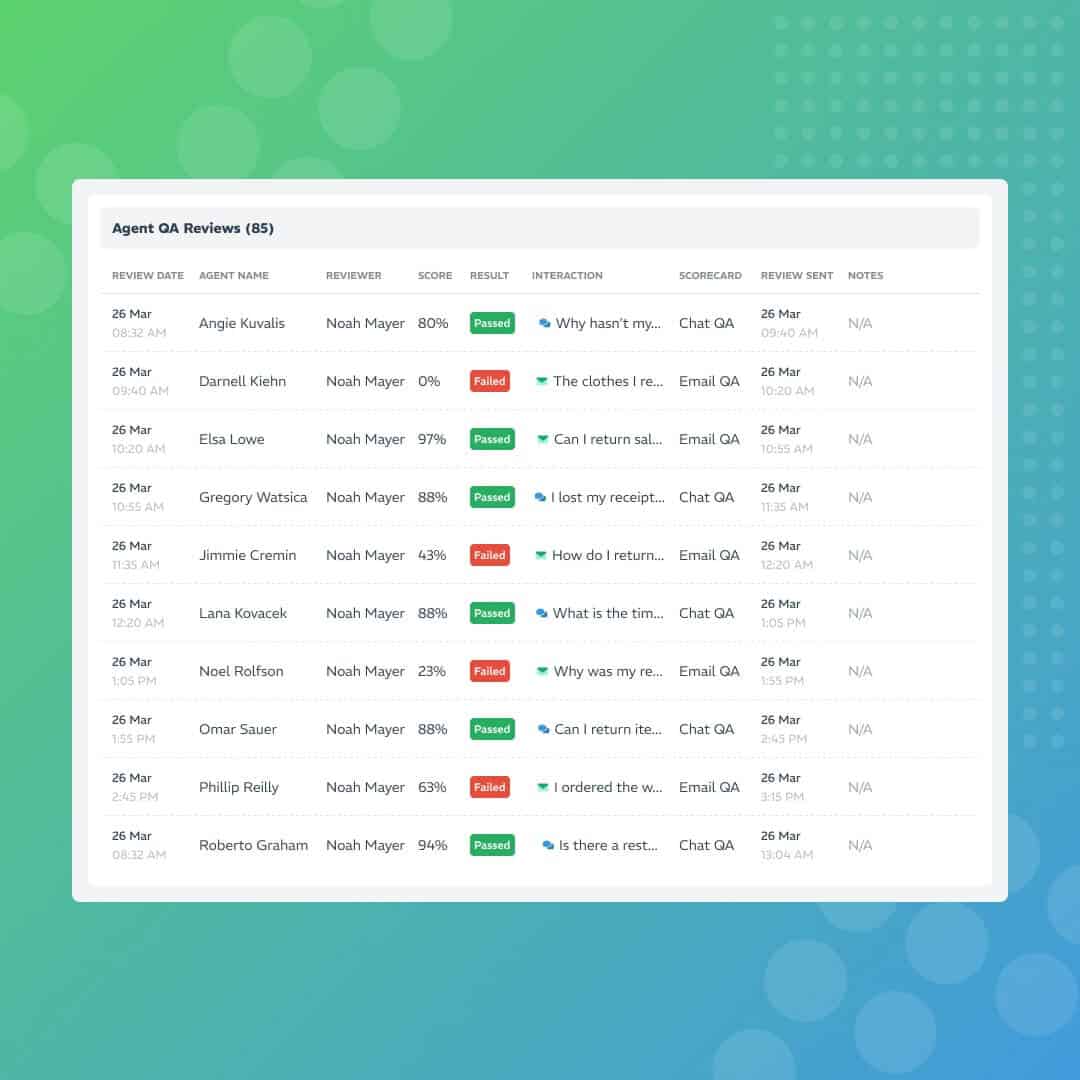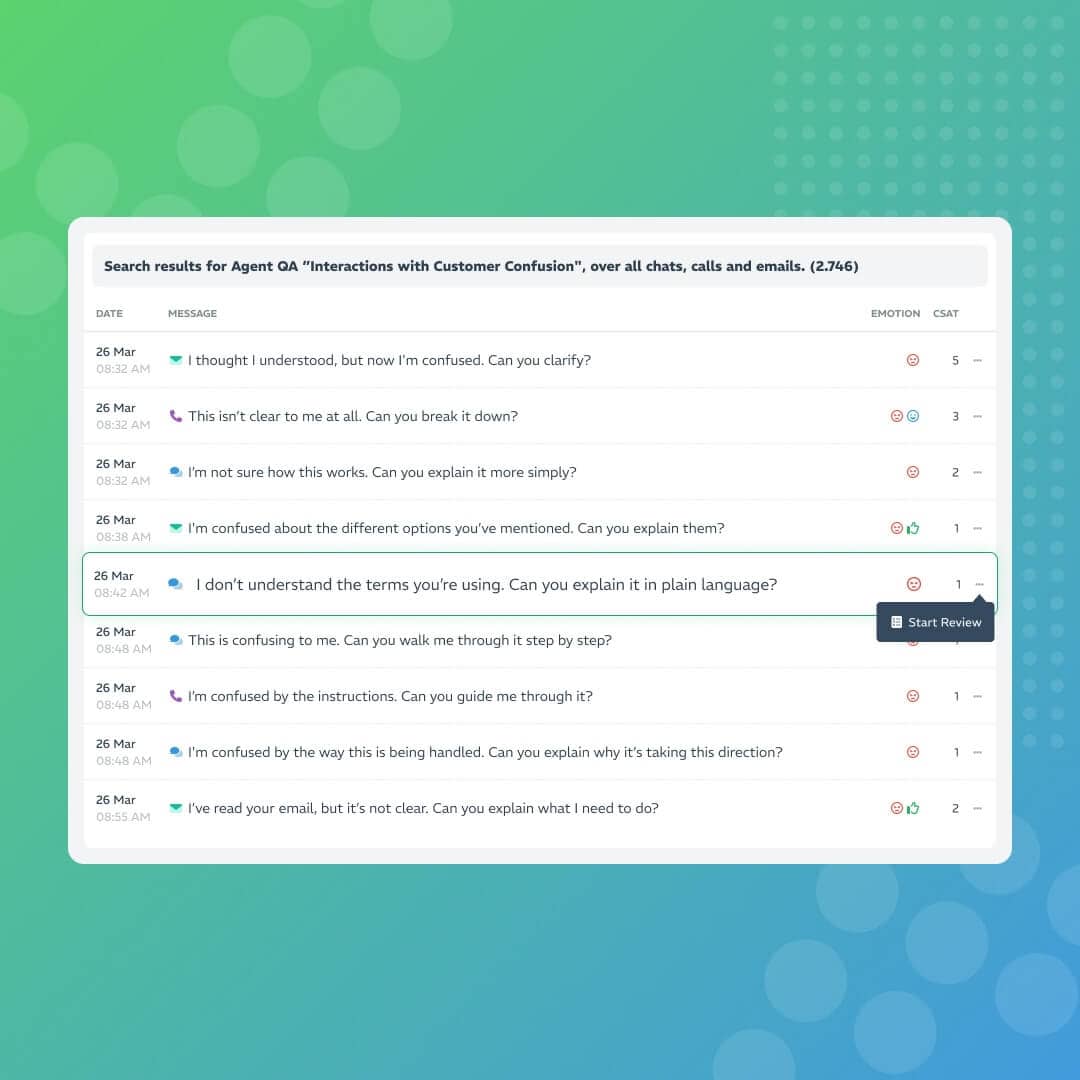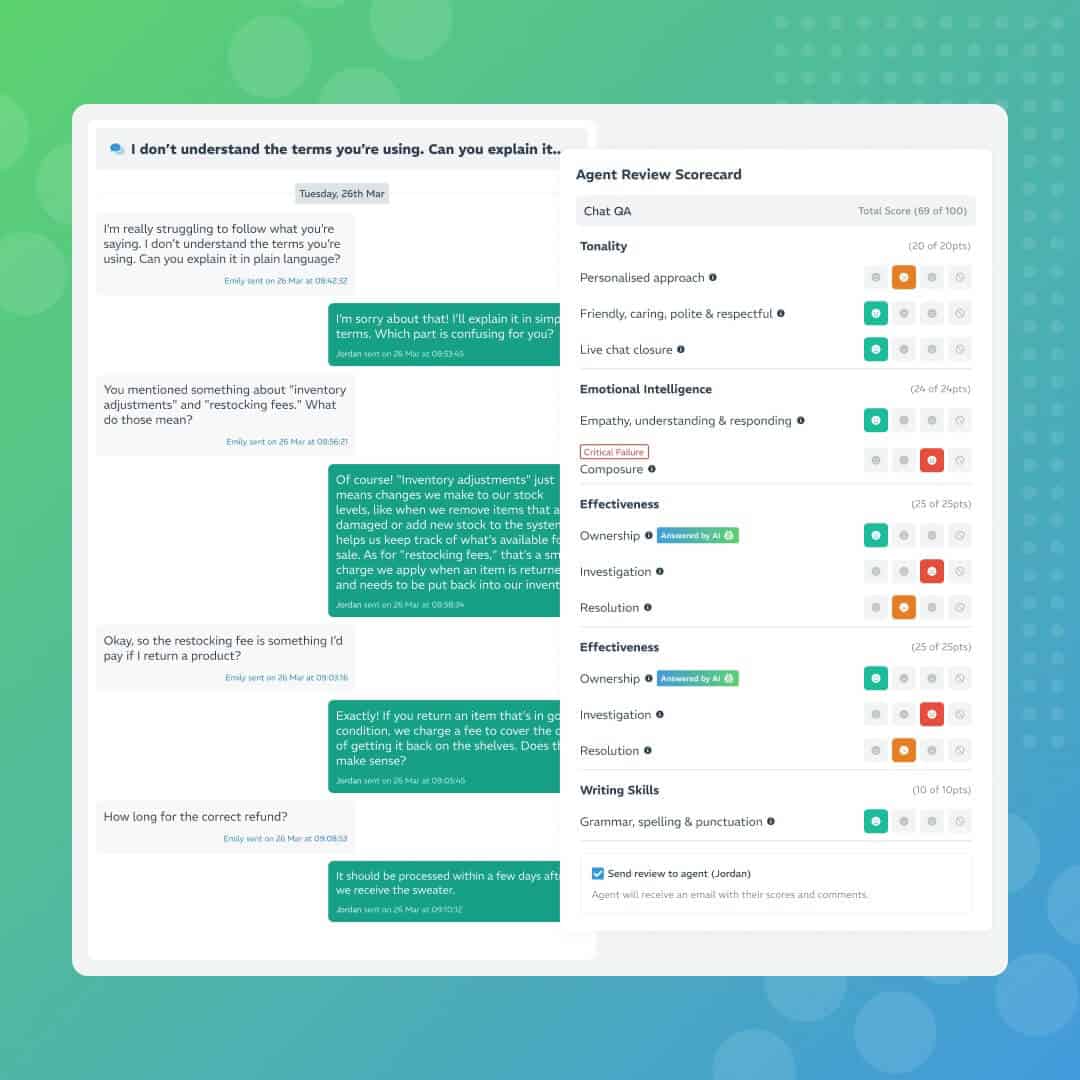Spotlight What Matters Most in Your Customer Conversations
Spotlight Summaries are here to shine a light on key trends in your conversations. This new feature analyses multiple interactions
Make agent QA both effective and efficient by blending AI and human expertise.

Customer service best practices are ever-evolving but always focused on the same North Star: increase sample review size, decrease audit time, and invest the recouped time into agent development. Unfortunately, manual QA processes are the biggest blocker of this goal. The audits are spread across multiple tools, which takes a significant amount of time. These time constraints limit the number of interactions that can be reviewed, and as a result, training opportunities slip through the cracks.
We get it; you’re not sticking with old-school methods without reason. Your analysts have spent time perfecting their QA processes and are hesitant to move into the unknown. That’s why we recommend a hybrid approach where cutting-edge AI technology meets human expertise. This powerful combination not only streamlines customer service QA, but also fosters a deeper understanding of interactions and still maintains a high level of customisation to meet your business’ unique needs.
As customer expectations skyrocket, embracing modern agent QA practices is no longer optional; it’s essential. So, take the first step and explore how blending AI and human insight can transform your quality assurance processes by:

The sheer volume of customer interactions has been a top challenge in QA for decades. Manually reading and listening to all conversations is inefficient and out of the question, but randomly selecting a few conversations a week for each agent only provides a very limited and incomplete view of their performance.
With multiple analysts, there’s also the issue of each quality specialist approaching reviews differently, which can lead to unfair grading. Plus, when agent QA reviews are spread across multiple systems, getting the feedback to agents takes time and can prevent them from making quick and effective positive changes to their service style. So, not only does this labour-intensive approach put your agents at a disadvantage, but it also prevents your customers from getting the best experience possible.
Today, the landscape is shifting dramatically as businesses look to improve operational efficiency and boost customer satisfaction scores with higher-performing agents. Around 54% of customer service leaders now leverage AI-powered tools to tackle complex support issues. Based on early use cases, industry experts predict that harnessing AI in the quality assurance process can cut QA costs by 50% and increase agent efficiency by up to 30%.
As more businesses embrace AI-powered agent QA, the focus is moving from basic compliance checks to improving agent performance and overall customer satisfaction.
What makes AI-driven tools so impactful is their ability to identify patterns, trends, and anomalies within large datasets, offering insights that manual reviews alone can’t match. For instance, AI can analyse every customer interaction to pinpoint compliance with protocols; perform sentiment analysis, like understanding subtle queues in customer feedback to detect confusion; and flag potential issues that need immediate attention. These results are impossible for a human analyst on their own.
But here’s the catch: the world of customer conversations is very much a human game. While AI does an excellent job at working within tight parameters and well-defined policies, the subtle nuances and complexities in interactions often need a human touch to fully understand what’s going on for an accurate assessment.
For example, you can ask AI to answer highly pointed questions, like “Did the agent open the call in a friendly manner?”, and it can scan and mark every conversation for having done it or not. A human, on the other hand, offers value where greater context is needed, such as “Did the agent showcase high knowledge of our products and approach the conversation in a structured way?”
If we lean solely on AI for agent QA reviews, we risk missing the mark on feedback quality. This can create a gap between agents and customers, leading to lower metrics and potential regulatory issues related to using AI for employee evaluations.
In our view, AI isn’t meant to take over; it should team up with human expertise to build a solid customer service QA process that benefits all parties involved. When you blend AI’s knack for data analysis with the invaluable insights of real people, you get a much clearer picture of customer interactions. This hybrid approach offers numerous benefits:
Sure, the benefits are great on paper, but what do they look like in the real world? Fair question, and luckily, we have a real-world use case on hand.
Since launching our Agent QA Reviews feature, our customers have begun implementing a modern customer service QA process and are seeing the impact. One iGaming client has already experienced measurable results in under seven weeks of transitioning from manual to hybrid agent reviews, noting agent response time is down 11%. They’ve also experienced a drop in customer frustration and an increase in praise.

If your organisation has a complex traditional system in place that’s taken a lot of time and effort, the thought of transitioning to a more modern approach can feel daunting. So, naturally, you want to make the transition worth it, right? The good news is that it doesn’t have to be complicated. With the right setup, you can ensure a smooth shift that benefits your company for years to come.
Start by getting clear on what you want from your QA process. Are you aiming for more consistent scoring across evaluators, faster turnaround on agent feedback, or more thorough insights from customer interactions? Maybe all three?
Also, take a look at what’s slowing your team down now, like random sampling, feedback delays, or inconsistent evaluations. Knowing your goals and pain points helps you focus your efforts where they’ll have the biggest impact.
A major efficiency pain point when dealing with QA is juggling spreadsheets, multiple tools, and CRMs. Opting for a system that pulls the full QA process into one place helps analysts stay focused and organised to complete agent reviews faster, resulting in a greater number of conversations covered. That’s why we’ve incorporated every aspect of QA into EdgeTier’s Coach tool, including scorecards, grading guidelines, and built-in translation.
AI has the power to review 100 % of all interactions and tag conversations that need further review by a human. To take full advantage of this power, you need to set criteria that matter the most to your organisation. Determine what flags indicate the need for closer inspection, such as:
Use your QA goals to help direct this list to make sure they’re aligned.
Tailor your agent coaching tools to reflect your organisation’s standards and objectives. This step can mean weighting certain criteria more heavily or including guidelines for reviewers to follow. Compare your old scorecards to your new goals and tagging lists to make sure what’s important to your company is reflected in the grading categories before uploading the criteria to your new system.
Once a review is complete, make sure the feedback is sent to agents as soon as possible. Fast, actionable feedback enables your customer support team to make quick improvements. It also fosters a sense of support and growth. Consider setting up regular feedback loops with team leads or coaches so that agents can ask questions, share insights, and continuously improve.
When it comes to your brand, customer experience can truly make or break you. It all starts with having a modern QA strategy in place. Ignoring the need for a balanced approach puts your company’s reputation and bottom line at risk. By embracing a hybrid model that allows AI to work hand-in-hand with human insights, you can create a QA process that’s not only effective but also enriches the customer experience and keeps you compliant with regulations.
At EdgeTier, we recognise the critical value of modern customer service QA. Our AI-powered solutions are built with input from real customer service teams, making them incredibly user-friendly and time-saving. Imagine a platform that gives you 100% coverage of conversations and an all-in-one review process, complete with built-in scorecards to streamline agent evaluations — that’s what we’ve created!
Let’s work together to elevate your QA strategy and make real, meaningful improvements in your customer interactions.
Spotlight Summaries are here to shine a light on key trends in your conversations. This new feature analyses multiple interactions
We’ve just added confusion detection to our emotion analysis tools. Now, you can easily spot when customers are confused, allowing
Discover how EdgeTier’s latest AI-powered updates can optimise your contact centre, including anomaly detection summaries, agent QA, and custom charts.
"EdgeTier is really shining when it comes to responsible gambling. We can proactively track critical issues and take actions, reducing human error."
"The anomaly feature is a game changer for us. It’s highly accurate and has helped us identify customer issues, agent errors, and even fraud that would have taken us longer to catch."
"We now have highly detailed understanding of agent performance, not just on key agent metrics, but also on how customers react to our agents and the emotions of our customers feel when talking to our team."



Let us help your company go from reactive to proactive customer support.
Unlock AI Insights